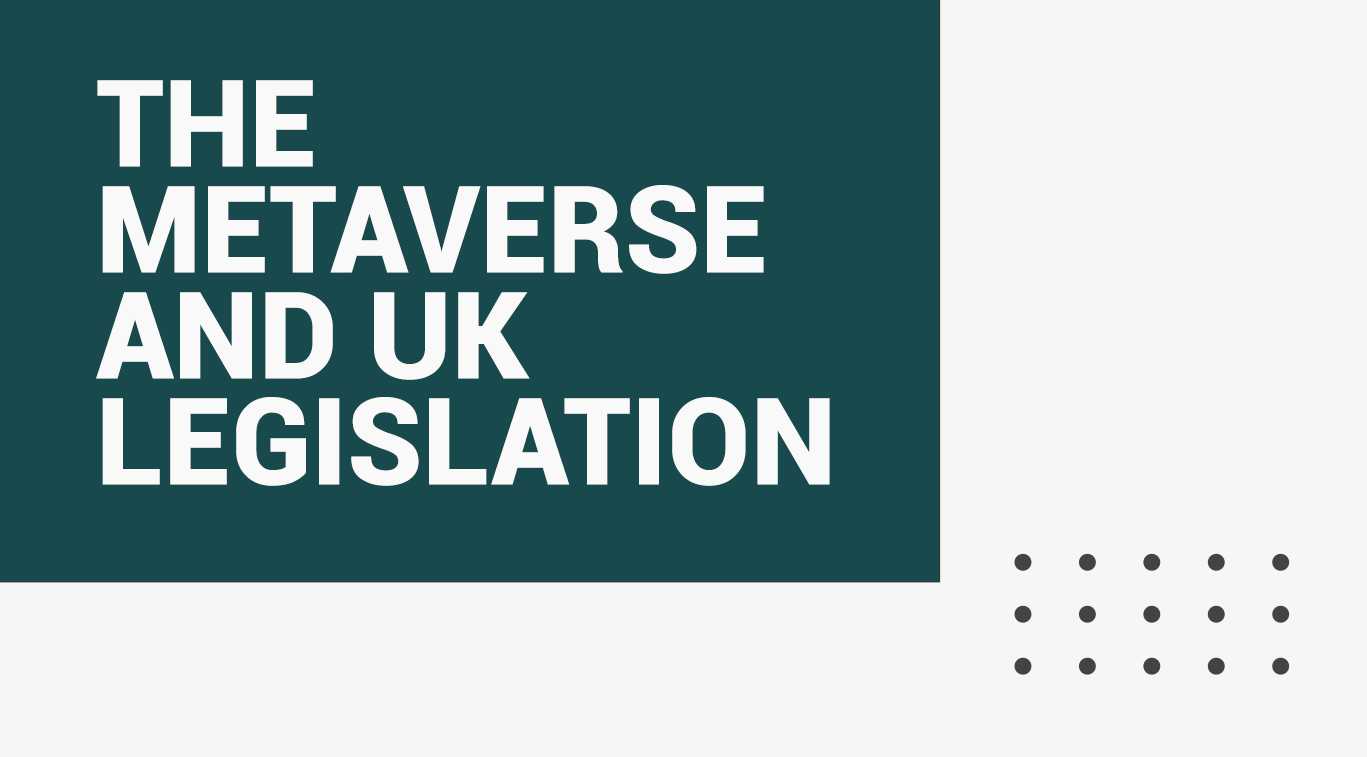The Metaverse and UK Legislation
The application of UK law on the
Metaverse and the possibility of legal implications

Written by Fatima Freifer
Blogger

What is the Metaverse?
The Metaverse has been defined as ‘a collective virtual shared space, created by the convergence of virtually enhanced physical reality and physically persistent virtual space, including the sum of all our virtual worlds’. User safety is paramount, though data privacy and cyber-security issues intersect with safety concerns. It appears likely to adapt to metaverse regulation within the UK legislation, as is the case for various legal technology trends and technology in the legal sector in a more general sense. UK legislation already recognises the Metaverse despite its infancy, but it remains to be seen as to the scope of its adaptability and scope for regulation. [1]
How UK legislation comes into effect
The UK is currently undergoing the process of designing, drafting and passing new legislation that will allow for blockchain in legal industry to be used in legal technology and smart contracts, digital financial transactions and cryptocurrencies. These laws will remove ambiguity surrounding the use of technology and related business models and are a step towards mainstream adoption. [2] The adoption of legal technology, artificial intelligence and the future of law practice has always been a question of reforming legislation for inclusivity in its approach as well as ensuring platforms remain secure.
Platforms are at the centre of the debate as a shift is occurring including the address to the proposed regulation of platforms in various jurisdictions. These are the discussions that policymakers, practitioners, and stakeholders will need to have imminently. These reports have resulted in proposed legislation such as the EU Digital Markets Act, as well as draught legislation before the UK Parliament and the US Congress.
Brexit, or the United Kingdom’s exit from the European Union, has fuelled new regulatory developments. The British approach to dealing with big tech has become increasingly clear in recent months, and the country is entering a neo-regulatory phase. On the regulatory front, the need to address the broad challenges of digital dominance prompted the formation of the Digital Regulators Cooperation Forum – a novel coalition of regulators aiming to share know-how across diverse fields as it grapples with platform regulation.
In this global context, a distinct British approach has emerged. Given the UK government’s promotion of its post-Brexit image, success in regulatory innovation is viewed as having potential assembling power – that is, as providing an influential route for shaping the institutional changes that will be negotiated internationally. The Global-British path is intended to be distinct and unique, a liberation from unwanted trammels, and to deviate clearly from the EU’s course and practise. At the same time, the more the UK deviates from its previous regulatory equivalence with the world’s largest trading bloc, the less it can rely on its previous regulatory equivalence.
Online safety bill
According to the experts whose work underpins the upcoming Online Safety Bill, the metaverse under the domain of legal tech, will be subject to strict UK regulation, subjecting the tech giants behind the virtual worlds to potentially billions of pounds in potential fines. According to the experts who co-wrote the soon-to-be-implemented Online Safety Bill. [3]
The notice, which is backed by the British government, comes just days after Meta, the company formerly known as Facebook, warned investors in a securities filing about potential regulatory risks associated with its metaverse strategy. Meta has already spent $10 billion on its unprofitable augmented-reality division, which is attempting to create an avatar-filled virtual world. [4]
The United Kingdom entered a consolidating phase in the development of platform regulation in 2020. The British Parliament has listed the ongoing fight against “online harms” as one of its five key priorities for the next two years. The demand for more regulation has resulted in two major areas of focus: “online harms” (primarily social and political issues) and a “pro-competition” approach (which concerns the malfunctioning of the market, supporting consumer interests, and innovation including legal technology software). [5]
While the subject of “online harms” has received the most attention in parliamentary, media, and public debate, the authors believe that the economic dimension of regulation – its emphasis on competition and innovation – will be at the forefront of current developments. [6]
Another potential legal ramification of the metaverse concerns data and data protection. The metaverse will make available new types of personal data for processing. This could include facial expressions, gestures, and other types of reactions produced by an avatar during metaverse interactions. [7]
The EU’s General Data Protection Regulation (GDPR), as well as the UK’s Data Protection Act, could theoretically apply to the metaverse. However, given the metaverse’s novel nature, the processes governing informed consent around data processing may need to be revisited to ensure that users’ rights are protected. [8]
The legislation is among the toughest crackdowns on big tech firms in the world, and the government hopes it will cement the UK’s position as a leader in both encouraging digital growth and reining in the excesses it allows. This also covers the impact of technology on legal services and legal technology solutions. Among the headline measures will be a strong duty of care imposed on large platforms in order to prevent harm online. [9]
Conclusion
There is some hope that the UK Government’s proposal for legislation to reduce online harms will enable the regulator Ofcom to address harm in the metaverse as well. The UK government is consulting on the implementation of a new digital market competition regime. This will focus on the work of the Digital Markets Unit (DMU), which is currently under the jurisdiction of the Competition and Markets Authority (CMA). The DMU will create enforceable “codes of conduct” for firms with Strategic Market Status (SMS), which will most likely include the same platform services that are targeted by the Online Safety legislation and implement legal tech innovation. [10]
References
[1] The UK Legal System and its Adaptability in the Face of Technological Change, Fatima Freifer
[2] How Legal Tech Will Shape Up The Law Industry, Fatima Freifer https://goodlawsoftware.co.uk/how-legal-tech-will-shape-up-the-law-industry
[3] Metaverse to Face Strict Online Rules in UK, PYMNTS, Feb 7 2022, https://www.pymnts.com/news/regulation/2022/metaverse-to-face-strict-online-rules-in-uk/#:~:text=The%20company’s%20metaverse%20could%20face,be%20implemented%20Online%20Safety%20Bill.
[4] Britain’s Trajectory as a Testing Nation, Fatima Freifer https://goodlawsoftware.co.uk/britains-trajectory-as-a-testing-nation
[5] UK’s New Approach to Regulate Platforms Yet to Be Tested, PYMNTS, Feb 2 2022, https://www.pymnts.com/news/regulation/2022/uks-new-approach-to-regulate-platforms-yet-to-be-tested/
[6] Regulating the future: the Online Safety Bill and the metaverse, Professor Lorna Woods, Professor of Internet Law, University of Essex and William Perrin, Trustee, Carnegie UK, Feb 4 2022 https://www.carnegieuktrust.org.uk/blog-posts/regulating-the-future-the-online-safety-bill-and-the-metaverse/
[7] Metaverse set for regulation, reckons Digital Minister, 25 Dec 2021, https://www.cityam.com/metaverse-set-for-regulation-reckons-digital-minister/
[8] Metaverse ‘cannot escape’ UK online rules, say experts, Madhumita Murgia and Tim Bradshaw, FEBRUARY 7 2022, https://www.ft.com/content/fa34ddf1-03d9-4375-b38a-96f251fda98b
[9] Artificial Intelligence: Impact in Legal Settings and Future Development, Fatima Freifer https://goodlawsoftware.co.uk/artificial-intelligence-impact-in-legal-settings-and-future-development
[10] The metaverse: three legal issues we need to address, Dr Pin Lean Lau, 02 Feb 2022








